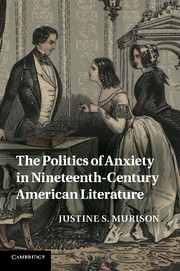Book contents
- Frontmatter
- Contents
- Acknowledgments
- Introduction
- 1 A bond-slave to the mind: sympathy and hypochondria in Robert Montgomery Bird's Sheppard Lee
- 2 Frogs, dogs, and mobs: reflex and democracy in Edgar Allan Poe's satires
- 3 Invasions of privacy: clairvoyance and utopian failure in antebellum romance
- 4 “All that is enthusiastic”: revival and reform in Harriet Beecher Stowe's Dred
- 5 Cui bono?: spiritualism and empiricism from the Civil War to American Nervousness
- Epilogue: the confidences of anxiety
- Notes
- Index
- CAMBRIDGE STUDIES IN AMERICAN LITERATURE AND CULTURE
3 - Invasions of privacy: clairvoyance and utopian failure in antebellum romance
Published online by Cambridge University Press: 01 June 2011
- Frontmatter
- Contents
- Acknowledgments
- Introduction
- 1 A bond-slave to the mind: sympathy and hypochondria in Robert Montgomery Bird's Sheppard Lee
- 2 Frogs, dogs, and mobs: reflex and democracy in Edgar Allan Poe's satires
- 3 Invasions of privacy: clairvoyance and utopian failure in antebellum romance
- 4 “All that is enthusiastic”: revival and reform in Harriet Beecher Stowe's Dred
- 5 Cui bono?: spiritualism and empiricism from the Civil War to American Nervousness
- Epilogue: the confidences of anxiety
- Notes
- Index
- CAMBRIDGE STUDIES IN AMERICAN LITERATURE AND CULTURE
Summary
And if the body were not the Soul, what is the Soul?
Walt Whitman, “I Sing the Body Electric” (1867)Few early defenses of mesmerism received more attention (and more derision) than well-known Whig editor and historian William Leete Stone's Letter to Doctor A. Brigham on Animal Magnetism (1837). In this account, Stone narrates his visit to Providence, Rhode Island, to meet Loraina Brackett, a blind clairvoyant under the care of Dr. George Capron, who, in the process of treating Brackett's deteriorating sight, proposed magnetism and discovered her clairvoyant abilities. Although declaring himself an “unbeliever” at the outset, Stone left Brackett's residence convinced. On their clairvoyant trip to New York City, they “walk” through the Battery and Castle Garden and eventually to Stone's house at 36 Church Street. As they enter the kitchen, Brackett describes two white women and a black woman cooking, and Stone encourages Brackett to try the food. At first she demurs, saying that “she could not taste any thing cooked by a black woman, because it was not clean,” but Stone reassures her that it is safe. After tasting the food, which she complains is too sweet, Stone reveals that “this was all incorrect as to our domestic establishment, and it struck me that she had by mistake entered the wrong house.” They rectify this mistake by heading across the street to Stone's house, through which Brackett walks, accurately describing his paintings and furniture.
- Type
- Chapter
- Information
- Publisher: Cambridge University PressPrint publication year: 2011



